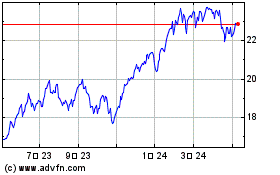GlobalData report highlights staggering $425.5 billion economic costs of obesity and overweight to U.S. Businesses and Employees in 2023
2024年2月22日 - 9:00PM
ビジネスワイヤ(英語)
Obesity and overweight are estimated to have caused a staggering
$425.5 billion in economic costs to U.S. businesses and employees
in 2023, according to a report released by GlobalData Plc, a
leading data and analytics company.
GlobalData’s report, ‘Assessing the Economic Impact of Obesity
on Employers: Identifying Paths Toward Work Force Health and
Well-Being,’ analyzes the economic and workforce implications of
obesity and overweight from the perspective of employers and
employees. Of the 158 million civilian employees on nonfarm
payrolls, 30% (46.9M) are classified as having obesity and 34%
(53.8M) have overweight.
Costs amounted to $347.5 billion attributed to obesity and $78
billion attributed to overweight. Costs include $146.5 billion in
higher medical costs for employees and their dependents, $82.3
billion in higher absenteeism (missed workdays), $160.3 billion in
higher presenteeism (reduced productivity due to illness), $31.1
billion in higher disability costs, and $5.2 billion in higher
Workers’ Compensation Program costs. The annual economic costs per
worker with obesity is $6,472, while the annual cost per worker
with overweight is $1,244 relative to a worker with healthy
weight.
The prevalence of obesity and overweight and the economic impact
varies by industry. Per 10,000 employees, the cost to employers and
employees of obesity and overweight ranges from $19.4 million in
the Professional & Business Services sector to $36.7 million in
the Government sector.
Obesity is a serious, progressive disease and is associated with
a range of other diseases, including type 2 diabetes,
cardiovascular diseases, and musculoskeletal disorders. With 5%
weight loss, which is achievable through lifestyle counseling that
helps people improve their diet and physical activity levels, 22%
of workers with obesity would no longer meet the criteria for
obesity. With 25% weight loss, which often requires medical
intervention, 78% of people with obesity could move out of obesity.
Sustained weight loss of 25% for people with obesity could reduce
average healthcare expenditures by $4,830 cumulative over 5
years—with estimated savings of $7,950 among workers with Class III
obesity.
"As a nation, we are all paying a high price for obesity. Yet,
when people with obesity get treated according to medical
guidelines, their health outcomes often improve, producing
cost-savings for employers and payers,” said Sally Greenberger,
President of the National Consumers League. “This is one of the
driving factors behind a new Obesity Bill of Rights for the nation,
which the National Consumers League and National Council on Aging
developed with leading obesity specialists. The Obesity Bill of
Rights is a call-to-action for policymakers, payers and employers
to eliminate the barriers impeding quality obesity care, which is
necessary for Americans to live healthier, longer lives.”
“It is important for employers to find ways to increase access
to and utilization of comprehensive obesity care for their
employees and their dependents,” says William H. Dietz, PhD,
Director of the STOP Obesity Alliance at George Washington
University. “Employers need to provide comprehensive obesity care
benefits, including behavioral therapy, bariatric surgery,
anti-obesity medications, and weight maintenance. These are all
tools for treating and managing the chronic and relapsing disease
of obesity.”
Supporting employees and their dependents to treat their obesity
has the potential to generate substantial economic benefits to
employers and their employees, as well as provide significant
benefits to society.
Considering the analysis, GlobalData has recommended actionable
steps for employers: Offer insurance coverage and wellness programs
for obesity care at parity with other chronic diseases. Implement
wellness programs. Foster a culture of support and inclusion that
recognizes and accommodates the needs of employees with obesity.
Provide education and resources to employees to educate about the
health risks associated with obesity as well as strategies for
obesity care and weight management.
GlobalData's report serves as a wakeup call to address the
obesity crisis head-on, with employers being a crucial stakeholder
in efforts to foster a healthier and more prosperous future for
employees and their families.
The study was supported by Eli Lilly and Company.
ENDS
To gain access to our latest press releases: GlobalData Media
Center
Analysts available for comment. Please contact the GlobalData
Press Office:
Email: pr@globaldata.com
For expert analysis on developments in your industry, please
connect with us on:
GlobalData | LinkedIn | X
Notes to Editors
- Quotes provided by Sally Greenberger, President of the National
Consumers League; William H. Dietz, PhD, Director of the STOP
Obesity Alliance at George Washington University
- Access the report and infographic.
- When incorporating images or videos into news articles, we
kindly request that media outlets exercise sensitivity in their
portrayal of individuals with obesity. The Obesity Action
Coalition’s Stop Obesity Weight Bias Campaign includes media
guidelines and bias-free image gallery.
About GlobalData
4,000 of the world’s largest companies, including over 70% of
FTSE 100 and 60% of Fortune 100 companies, make more timely and
better business decisions thanks to GlobalData’s unique data,
expert analysis and innovative solutions, all in one platform.
GlobalData’s mission is to help our clients decode the future to be
more successful and innovative across a range of industries,
including the healthcare, consumer, retail, financial, technology
and professional services sectors.
View source
version on businesswire.com: https://www.businesswire.com/news/home/20240222351629/en/
pr@globaldata.com
Evolve Cloud Computing (TSX:DATA)
過去 株価チャート
から 12 2024 まで 1 2025

Evolve Cloud Computing (TSX:DATA)
過去 株価チャート
から 1 2024 まで 1 2025
